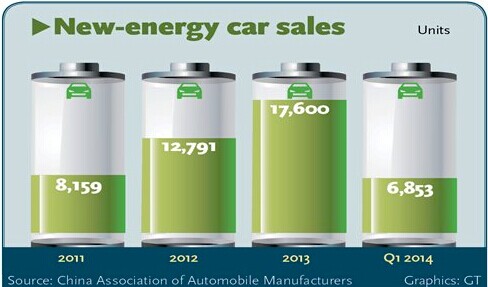

The State Grid Corporation of China (SGCC) announced Tuesday that it would allow private capital to participate in the electric-vehicle charging facilities sector, which analysts said will offer another boost for the development of new-energy vehicles.
This will allow private capital to invest in and operate projects in the sector, Xinhua News Agency reported Tuesday.
Individuals will need to have their own parking space as well as permission from their community management in order to install the charging facilities, according to Xinhua.
One kilowatt-hour of electricity for new-energy vehicles costs 0.5 yuan ($0.08) - the same price level as residential power use, according to Xinhua.
The SGCC said projects for connecting distributed power grids to the State grid will also be opened up to private capital, amid the government's call to develop a diversified ownership economy.
Distributed power grids are generally small-scale generators that are used mainly for providing electricity for households.
SGCC spokeswoman Wang Yanfang said at a press conference Tuesday that the estimated market value of the two sectors will reach 200 billion yuan by 2020, the Xinhua report said.
The SGCC has already started to include private capital in the construction of a national network of charging facilities.
In April, private company Zhejiang Wanma New Energy Co was listed as a candidate for a public tender for building charging facilities.
However, Gao Jian, an analyst at Shanghai-based consultancy LMC Automotive, noted that although the sector is now open to private capital, the SGCC will still have a leading role in constructing the charging network, as "it requires substantial capital to invest in the sector."
Gao noted that the construction of charging facilities has been the major factor hindering the development of new-energy cars in China.
"If the problem of charging is solved, the sector could see explosive growth in the future," he said.
China sold a total of 6,853 new-energy vehicles in the first quarter of this year, up 120 percent year-on-year, according to data from the China Association of Automobile Manufacturers.
But experts noted that the sales were mainly to public bodies like bus operators, and private consumers still account for a very small part of the sales.
Wang Gang, a 29-year-old engineer in Beijing, said that charging facilities, the range per charge and safety concerns are major factors that make him reluctant to buy a new-energy car, even though it is easier to get a license plate for such vehicles.
"The lack of charging infrastructure is the major factor obstructing the development of our company," Zhang Hui, a marketing official at Beijing-based Yika Car Rental Service, which offers electric-car rental services, told the Global Times Tuesday.
Several cities including Beijing, Shanghai and Xi'an have recently rolled out detailed policies to support the development of new-energy vehicles.
In a document released on May 22, the Beijing municipal government said that new-energy car producers as well as community management should help consumers in installing the charging facilities.
The SGCC earlier this month also announced a plan to build a national charging network that will cover major expressways.
By 2013, the company had built 400 charging stations, with 19,000 charging posts throughout the country, it said in a Weibo post on Tuesday.
Gao said the new-energy vehicle industry will be boosted by President Xi Jinping's comments last week that greater importance should be attached to the sector.
"New-energy vehicles are expected to get wider acceptance among private consumers by around 2016," Gao said.
US premium electric-car maker Tesla Motors, which made its first batch of deliveries to China in April, also unveiled its first solar supercharger in Beijing last month. The company now has three solar superchargers in Beijing and Shanghai.
Tesla said that its solar supercharger network will be independent of the State grid network, a plan that has been questioned by many experts.
"The SGCC's decision to allow private capital to operate projects to connect distributed power plants to its network has basically sent a signal that Tesla can connect its charging stations to the national grid," Gao noted.
State Grid solicits social capital
2014-05-28Power supplier will seek private capital
2014-05-28Projects open to private capital
2014-04-24China to allow private capital into more state projects
2014-03-05Sinopec private-capital-soliciting: big step, further openings expected
2014-02-21Sinopec allows private capital in sales business
2014-02-20Copyright ©1999-2018
Chinanews.com. All rights reserved.
Reproduction in whole or in part without permission is prohibited.